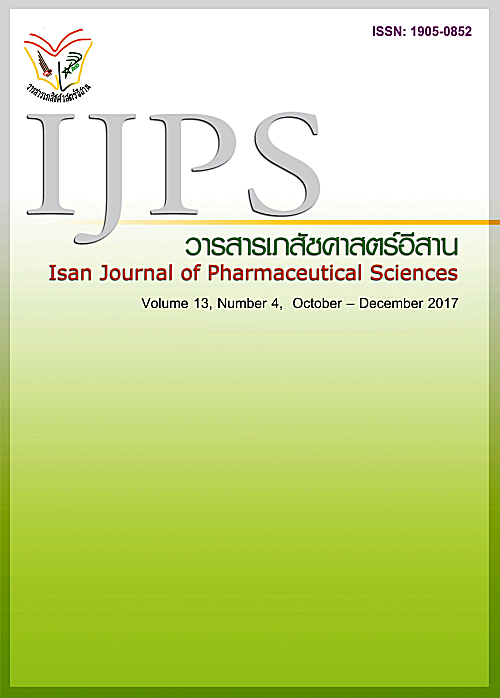Medication Reconciliation Processes in In-patient Department of Public Hospitals in Region 7 of National health Security Office, Ministry of Public Health
Main Article Content
Abstract
This descriptive research was aimed to study the medication reconciliation processes in cases of in-patients of public hospitals. The study hospitals are 63 public hospitals in Region 7 of National Health Security Office, Ministry of Public Health. Using the semi-structured interview questionnaire, the researcher interviewed 71 pharmacists, who were mainly responsible for medication reconciliation processes of each hospital. The interviews were conducted during October 1, 2015 to January 31, 2016.
Only six hospitals had the processes that was completed to the concepts of medication reconciliation with four components; verification, clarification, reconciliation, and transmission. Fifty four hospitals had the processes which were partly covered the concepts. The medication reconciliation processes of some hospitals were executed in the patient admission process, while others were executed in the in-patient discharge process. In three hospitals, the medication reconciliation processes were not complete as the suggestion according to the lack in two major components; the reconciliation and the transmission.
There were a wide variety of the medication reconciliation processes among study hospitals. The processes varied in terms of selected patients groups, time of ending in admission process, selected sources of information for patient medical history, algorithms of medication reconciliation processes, and health professional personals who involved in the processes. Additionally, the readiness of each hospital for the medication reconciliation procedure was varied. The factors influencing medication reconciliation procedure could be classified into four groups, 1) the context of hospitals 2) the hospital policies 3) the clear processes 4) health professional personals
The medication reconciliation process was important to all study hospitals, though the operation guidelines of medication reconciliation of each hospital were varied according to hospitals’ contexts. The influencing factors to readiness of each hospital support the completeness of medication reconciliation process and the coverage of patients, and these would lead to patient safety goals.
Article Details
In the case that some parts are used by others The author must Confirm that obtaining permission to use some of the original authors. And must attach evidence That the permission has been included
References
Accrediation Canada, the Canadian Institute for Health Information, the Canadian Patient Safety Institute, and the Institute for Safe Medication Practices Canada. Medication Reconciliation in Canada: Raising The Bar – Progress to date and the course ahead [online] 2012 [cited 2014 January 24]. Available from: https://www.accreditation.ca/sites/default/files/med-rec-en.pdf
Almanasreh E, Moles R, Chen TF. The Medication Reconciliation Process and Classification of Discrepancies: a Systematic review. Br J Clin Pharmacol 2016a; 82: 645-58.
______. Systematic Review of Medication Reconciliation Best Practices [Abstract]. Res Social Adm Pharm 2016b; 12: e19-47.
Angkhana Khomwong. Situation Analysis of Medication Reconciliation: Hospital Pharmacists’ Understanding, Attitude. Master of Science Thesis in Clinical Pharmacy]. Bangkok: The Graduate School, Chulalongkorn University; 2008. [in Thai].
Barnsteiner JH. Chapter 38: Medication reconciliation. In: Hughes RG, editor. Patient safety and quality: An evidence-based handbook for nurses. Rockville (MD): Agency for Healthcare Research and Quality (US); 2008.
Boonyaruk Boonthawee. Medication Reconciliation Process in In-Patient Setting at Yasothon Hospital. Master of Pharmacy Thesis in Clinical and Administrative Pharmacy]. Ubon Ratchathani: The Graduate School, Ubon Ratchathani University; 2010. [in Thai].
Greenwald JL, Halasyamani LK, Greene J, LaCivita C, Stucky E, Benjamin B, et al. Making Inpatient Medication Reconciliation Patient Centered, Clinically Relevant, and Implementable: A Consensus Statement on Key Principles and Necessary First Steps. The Joint Commission Journal on Quality and Patient Safety 2010; 36: 504-13.
Komkrit Srisawai. Evaluation of Automatic Electronic Medication Reconciliation in Chiangraiprachanukroh Hospital. [Master of Science Thesis in Pharmacy Management]. Khon Kaen: The Graduate School, Khon Kaen University; 2010. [in Thai].
Kwan JL, Lo L, Sampson M, Shojania KG. Medication Reconciliation During Transitions of Care as a Patient Safety Strategy. Ann Intern Med 2013; 158: 397-403.
Marien S, Krug B, Spinewine A. Electronic Tools to Support Medication Reconciliation – a Systematic Review. J AM Med Inform Assoc 2016; 0: 1-14.
Mekonnen AB, McLachlanet AJ, Brien JE. Pharmacy-led Medication Reconciliation Programmes at Hospital Transitions: a Systematic Review and Meta-analysis. J Clin Pharm Ther 2016a; 41: 128–144.
______. Effectiveness of Pharmacist-led Medication Reconciliation Programmes on Clinical Outcomes at Hospital Transitions: a Systematic Review and Meta-analysis. BMJ Open 2016b; 6: e010003.
______. Impact of Electronic Medication Reconciliation Interventions on Medication Discrepancies at Hospital Transitions: a Systematic Review and Meta-analysis. BMC Med Inform Decis Mak 2016c; 16: 112.
Michaelsen MH, McCagu P, Bradley C, Sahm LJ. Medication Reconciliation at Discharge from Hospital: A Systematic Review of the Quantitative Literature. Pharmacy 2015; 3: 53-71.
Mueller SK, Sponsler KC, Kripalani S, Schnipper J. Hospital-based Medication Reconciliation Practices: A Systematic Review. Arch Intern Med 2012; 172(14): 1057-69.
Nussara Kattamarn. The Study of Medication Error by Using Drug Reconciliation Medthod: Case Series Follow Up Discharged Patients Current Medications. [Master of Pharmacy Independent Study in Pharmacy Management]. Khon Kaen: The Graduate School, Khon Kaen University; 2013. [in Thai].
Resar R. Medication Reconciliation Review: Institute for Healthcare Improvement. New York: McGraw-Hill; 2008.
Suthatong Mungmee. Medication Reconciliation in Outpatient Visiting Medicine and Surgery Clinics at H.M. Queen Sirikit Hospital. Master of Science Thesis in Clinical Pharmacy]. Bangkok: The Graduate School, Chulalongkorn University; 2010. [in Thai].
The Joint Commission. 2005 Joint Commission National Patient Safety Goals: Practical Strategies and Helpful Solutions for Meeting These Goals [online] 2005 [cited 2016 December 28]. Available from: https://teacherweb.com/NY/StBarnabas/Law-PublicPolicy/JCINT-2005.pdf
______. National Patient Safety Goals Effective Janauary 1, 2016 [online] 2016 [cited 2016 December 28]. Available from: https://www.jointcommission.org/assets/1/6/2016_NPSG_HAP.pdf 2016
Thida Ningsanon, Preecha Montakarnkul, Suwattana Julawattanaton. Medication Reconciliation. Bangkok: Prachachon; 2009.
Wandee Sumret. Comparative Effectiveness of Medication Reconciliation Developed by a Multidisciplinary and a Hospital Administration Team. [Master of Pharmacy Thesis in Clinical Pharmacy]. Nakhon Pathom: The Graduate School, Silpakorn University; 2011. [in Thai].


